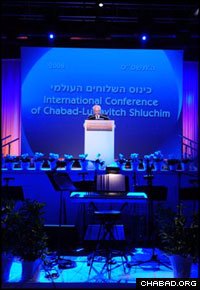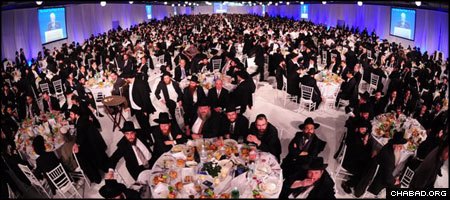In an evening replete with lively dancing and a series of inspiring speeches from Jewish leaders and an Israeli diplomat, more than 3,000 rabbis joined 1,000 of their supporters for the concluding banquet of the 25th-annual International Conference of Chabad-Lubavitch Emissaries.
Held at Pier 94 on Manhattan’s Upper West Side, the gala affair capped six months of work by an international planning committee. A total of 72 countries were represented at the dinner, which honored the work of emissaries and lay leaders in strengthening Jewish life in every corner of the globe.
Throughout the evening, the proceedings kept returning to the theme of hakhel, a once-in-seven-years gathering of the Jewish people that has its roots in the days of the Holy Temple, but in modern times refers to the responsibility of each and every person to infuse their communities with a reinvigorated commitment to G‑d and His Torah.
Rabbi Ari Shishler, director of Chabad-Lubavitch of Strathavon in Johannesburg, South Africa, came with a lively group of ten men from his community spanning in age from 20 to 54. They called themselves “the Minyan.”
Well before the room erupted in a torrent of spontaneous dancing – an annual occurrence that follows the traditional roll call of emissaries led by Rabbi Moshe Kotlarsky, conference director and vice chairman of Merkos L’Inyonei Chinuch, the educational arm of Chabad-Lubavitch – Shishler and his guests had formed a rotating chorus of their own.
Dancing around their table with arms locked in unison, the group swallowed up more than one bystander into their circle of merriment.
“I love your energy!” yelled one member in between notes of a wordless Chasidic melody known as a nigun. “I love it! I love it!”
Steven Solrash, the oldest of the group, made the 18-hour flight to New York with 25-year-old son, Simcha.
“My rabbi schlepped me,” he stated with a smile. “And so I schlepped my son.”
Solrash’s last appearance at the emissaries conference was in 2002, when the banquet took up several ballrooms of a Brooklyn Heights hotel.
“This has grown exponentially since I was last here,” he said. “It’s really unbelievable. And the outpouring of love and energy is just incredible. Here, everyone’s soul is sparked: They come alive, ignited like a flame.”

Igniting the Flame
The statement echoed a teaching that former Israeli ambassador Yehuda Avner attributed to the Rebbe, Rabbi Menachem M. Schneerson, of righteous memory, during his speech on behalf of the lay leadership. Avner said that the Rebbe told him that a person can be compared to a candle, with the wax representing the body and the wick corresponding to the soul.
“When you bring the flame of Torah to the soul, then the body will fulfill the purpose for which it was created,” Avner said the Rebbe told him.
And the Rebbe, added Avner, set out “to ignite the soul of every Jew with the fire of Torah.”
The Israeli related that he asked the Rebbe if he had lit the diplomat’s own candle.
“No, he said,” related Avner. “I have given you the match. Only you can light your own candle.”
“Exhilarating,” said Simcha Solrash. “Positive vibes all around. This conference reinforces for us the responsibility we have to reach out and make a difference in our country, continent and the world.”
Asked how he would describe the experience to his friends back home, the son responded without hesitation: “It’s not about putting this into words. It’s more important to put it into action, to increase in helping Jews, to put tefillin on with them, to draw them closer to their roots.”
Solrash revealed that when he returns to South Africa, he plans to drive around town with friends once a week in order to help local Jews don tefillin.
“Being around so many tzadikim who are doing the work of G‑d around the world rubs off on you,” said Solrash, using a Hebrew word denoting the righteous deeds of individuals. “It’s encouraging and inspiring, and reminds us of the great task that we have before us.”
Among the many guests who attended the banquet was radio talk-show host Dennis Prager, who sat across from Kotlarsky. The broadcaster came at the invitation of Rabbi Moshe Bryski, co-director of Chabad-Lubavitch of the Conejo in Agoura Hills, Calif., who delivered a keynote address about the infinite nature of Jewish unity.
In his speech, Bryski told of the actions of local residents who in their own unique ways had rededicated themselves to Jewish life. One elderly woman looked forward to Bryski trekking to her home to blow the ram’s horn during Rosh Hashanah. Another gentleman, who was on the brink of ending his life, happened to find himself at a Chanukah party at a mall, where he decided to pick up the scattered pieces of his past.
“The individual is the world,” said the rabbi. “And the world is in the individual.”
“It is my honor to be here, because Chabad is the most dynamic force in Jewish life,” said Prager. “I learn from many [emissaries] out there in the field.
“This gathering is unique, because who else does what [the emissaries] do?” he added. “We’ve been missing this for thousands of years. It used to be that if it wasn’t in Jerusalem, Bnei Brak or Brooklyn, then it wasn’t taken seriously. [Chabad has] changed that.”





Start a Discussion